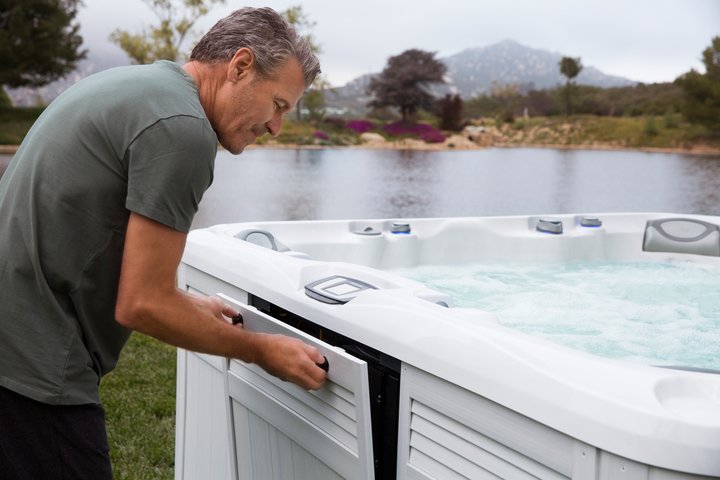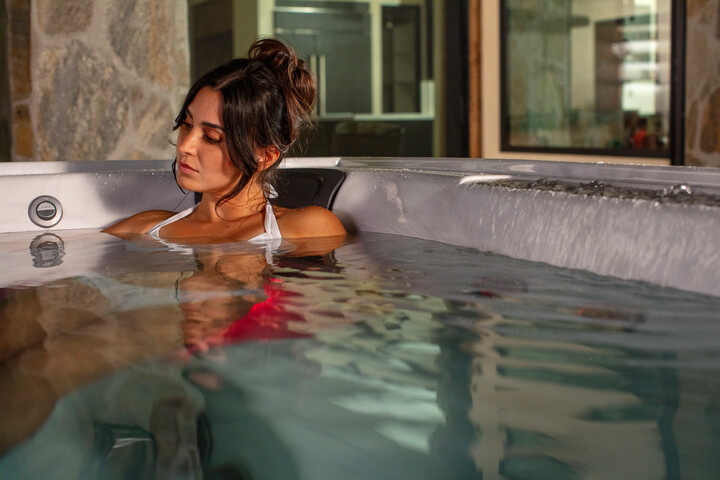Hot tubs and pools not only provide recreational fun but physical and mental benefits that many enthusiastically dive into. They are both great ways to get together with loved ones, along with getting exercise and therapy. As enjoyable as pools and hot tubs are, it’s important to think about safety and hygiene.
What kind of ingredients and chemicals are we exposing our bodies to? Water is a breeding ground for bacteria, so it’s vital to understand why utilizing chlorine-based pools and hot tubs is critical in maintaining the overall health of your water system.
There has been a lot of debate about whether you should use salt water or chlorine when it comes to hot tubs and pool maintenance. We’ll take a dive into the topic and show why chlorine is still better than salt water.
The Myth About Saltwater Pools
The growing popularity of saltwater pools and hot tubs has brought along several myths. The most common misconception is that saltwater pools and tubs are chlorine-free. This is not true, because saltwater systems actually use chlorine generators. These generators fuel electricity through sodium chloride, that produces chlorine as a disinfectant. Thus, there is no such thing as a completely chlorine-free pool.
History of Pools and Hot Tubs
Pools have been around for centuries. Throughout their existence, they have continuously evolved, using multiple treatment methods for maintenance and safety. For example, over the last 100 years, pools have been treated with the following:
- Chlorine – The first chemical invented for pool treatments in the early 1900s.
- Ozone – Originally used to disinfect drinking water, Ozone was eventually used by Europe and the U.S. in the 60s and 70s to clean pool water.
- UV (ultraviolet) – UV rays destroy bacteria and viruses by attacking their genetic core DNA.
- Saltwater – With roots from Australia, this is a simple treatment method that entails using salt to produce chlorine.
- Direct Hydroxyl Injection – A recent and modern method that involves injecting hydroxyl radicals to sanitize water.
Hot tubs have also been around for centuries. (Who doesn’t love a good soak?) It all began with the birth and popularity of hot springs and bathing chambers.
Providing hydrotherapy, soaking in hot springs was common among hunters and gatherers who often spent their days doing strenuous physical activities. Later in history, with Japan’s hot springs (onsen) and the ancient Romans’ public and private baths (balnea, balnea privata, and balnea publica), the concept of hot baths was widely favored activity across cultures.
Japan was the first to create the modern hot tub (furo) and inspired its growth in the U.S. The tubs were originally wooden and caused problems such as mold and leakage since they were unable to support water sufficiently. But over time, wooden tubs turned into fiberglass and then acrylic, accompanied by the installation of water and insulation filters.
Safety First
As mentioned, water is a breeding ground for bacteria and viruses. Therefore, it’s vital that you use chlorine in hot tubs or pools in
order to keep water healthy and safe for longer periods of time. More importantly, chlorine allows you to properly protect yourself and your loved ones from illnesses.
Though it may be obvious, it’s important to remember that hot water operates differently than cool water does. Hot water carries different requirements in terms of the kinds of minerals and chemicals needed; chlorine hot tubs preserve and upkeep the necessary safety specifications.
History of Chlorine and Why it’s Used
Chlorine has been used since the early 1900s as a way to disinfect water. It was the first chemical used for pool treatment. Brown University is known to be the first to attempt to sterilize a pool with chlorine in 1910. In addition to water treatment, it’s now widely used across industries such as food production, solar energy, and automotive.
Chlorine has been widely used to combat harmful bacteria in hot tubs and pools. Not only is it cost-effective, but it is the most-trusted method when it comes to hot tub and pool treatment.
Pros and Cons of Chlorine Water Treatment
Chlorine is preferable over other treatment options for a variety of reasons:
- It is more affordable and cost-effective.
- Chlorine hot tubs require less upkeep and last longer than saltwater hot tubs.
- Chlorine achieves cleanliness and oxidation levels that other chemicals and methods do not.
- Chlorine does not cause any damage to the features of hot tubs and pools.
Some cons of chlorine are:
- People with sensitivities to chlorine can experience irritation to their skin, scalp, and eyes upon exposure to a chlorine pool or hot tub.
- If there are large amounts of chlorine gas hovering over your hot tub or pool, it can be harmful to your lungs.
- Chlorine carries a very distinctive smell that some people find unpleasant.
Pros and Cons of Saltwater Treatment
In order to have a comprehensive understanding of the salt vs chlorine pool debate, it’s helpful to flesh out the pros and cons of salt water treatment in addition to the pros and cons of chlorine water treatment.
The pros of salt water treatment are:
- Though they carry chlorine, saltwater hot tubs and pools are gentler on the eyes, scalp, and skin.
- It fosters buoyancy, which can be very beneficial in the overall relaxation experience of the hot tub.
- Salt water does not produce an unpleasant odor.
The cons of salt water treatment are:
- Salt water hot tubs are expensive. Moreover, saltwater replacements are more expensive than chlorine-based systems.
- Saltwater systems require specific maintenance that can otherwise easily create an unsanitary environment. For example, when the water temperature falls below 60 degrees F, the system has a difficult time producing adequate chlorine. Therefore, bacteria is more likely to form.
- Salt is a catalyst for rust and corrosion. Thus, it’s likely to damage your hot tubs and pools.
Salt Water vs Chlorine Pool
So with the pros and cons of both chlorine and salt water treatments, what exactly makes chlorine hot tubs better than salt water hot tubs?
Though chlorine may have its drawbacks, when it comes to the saltwater vs chlorine debate, chlorine proves to be the more cost-effective and safer option:
- Chlorine requires less upkeep.
- Chlorine hot tubs last longer than salt water hot tubs.
- Chlorine is more affordable and cost-effective. Saltwater systems are more complicated to install, thus entailing high installation and maintenance fees. Not to mention, saltwater replacements are more expensive than updating chlorine-based hot tubs.
- Saltwater pools have less chlorine levels than actual chlorine-based pools. Thus, the likelihood of bacteria and viruses forming is higher in saltwater pools and hot tubs.
Saltwater is more prone to cause corrosion, so you’re likely to see more wear and tear to your hot tub and pool.
Choose Chlorine
Though the saltwater vs chlorine pool debate brings up several key factors, chlorine is still the most trusted, widely used, and best option for pool safety and maintenance.
It’s been used for pool and hot tub treatment for over 100 years.
Not only does it preserve the features of your hot tub, but chlorine also provides more financial and operational relief than salt water hot tubs.




